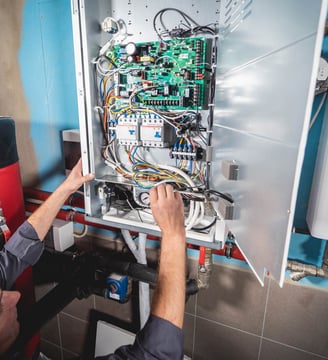Intelligent Maintenance Technology A
Blog post description.
الصيانة والتشغيل والهندسة الفنية
1/3/20243 min read
Intelligent Maintenance Technology


Introduction:
In an era where technology is becoming increasingly complex and essential, the course "Smart Maintenance Technology: Tools and Methods" stands out as a vital opportunity for professionals in the maintenance field to expand their knowledge and skills to keep pace with these advancements. Carefully designed to cover a wide range of modern and innovative technologies, this course aims to equip participants with the necessary tools and methods to efficiently apply smart maintenance technology. We will delve into understanding how to use big data, augmented reality, artificial intelligence, and machine learning to enhance maintenance processes and reduce faults.
Participants in the course will gain a deep understanding of how to analyze data to predict faults before they occur, as well as develop preventive and predictive maintenance strategies. The course also includes a study of the latest techniques in condition monitoring and self-diagnosis of equipment, enabling organizations to maximize efficiency and reduce costs. Additionally, the focus will be on developing practical skills to apply these technologies in different work environments and integrate them seamlessly with existing systems to ensure a smooth and effective transition. This course serves as a bridge connecting maintenance professionals to an advanced technological future, where they will have the ability to improve performance, increase productivity, and enhance sustainability in their organizations.
Course Objectives:
Introduce participants to the concepts and principles of smart maintenance technology and its practical applications.
Explore how artificial intelligence and machine learning can enhance maintenance operations.
Learn big data analysis for predicting faults and improving maintenance strategies.
Acquire the ability to apply predictive maintenance techniques to minimize faults and increase efficiency.
Understand how to use technology to improve the efficiency of maintenance operations and reduce costs.
Develop the necessary skills to seamlessly integrate new technological solutions with existing systems to ensure effective application.
Apply smart maintenance techniques to enhance environmental sustainability and ensure operational safety.
Training Methodology:
The training methodology in the "Smart Maintenance Technology: Tools and Methods" course relies on providing an interactive and practical learning experience that combines advanced theories with practical applications. The course is designed to encourage active participation through workshops, case studies, and simulations, allowing participants to gain a deep understanding and direct application of smart maintenance technologies. Complex concepts will be presented in a simplified and practical manner, with a focus on how to use big data, artificial intelligence, and machine learning in the context of practical maintenance. The course also includes interactive exercises aimed at enhancing participants' analytical and creative skills, providing opportunities to learn from others' experiences and exchange ideas, leading to a comprehensive understanding of how to effectively apply these technologies in real work environments.
Program Content:
Introduction to Smart Maintenance Technology:
Understanding the basics and key concepts.
Importance of smart maintenance technology in modern industry.
Overview of maintenance types: preventive, predictive, and proactive.
Differences between traditional and smart maintenance.
Evolution of smart maintenance technology and current trends.
Artificial Intelligence and Machine Learning in Maintenance:
How to use artificial intelligence to enhance maintenance.
Applications of machine learning in predicting faults.
Using computer modeling for data analysis.
Performance monitoring and self-diagnosis.
Real-world case studies and practical applications.
Big Data and Data Analysis in Maintenance:
Collection and management of big data in maintenance.
Data analysis for predicting faults and identifying trends.
Application of statistical analysis tools.
Using data to make maintenance decisions.
Practical cases for applying big data.
Predictive Maintenance Techniques:
Fundamentals of predictive maintenance and its importance.
Techniques for condition monitoring and diagnosis.
Tools and methods for predicting faults.
Integration of predictive maintenance with existing systems.
Case studies of effective predictive maintenance.
Augmented Reality and Digital Technology in Maintenance:
• Using augmented reality in maintenance and repair.
• Applications of virtual reality and simulation.
• Integration between digital technology and maintenance.
• Improving training and qualification of maintenance teams.
• Case studies on successful applications.
Automation and Smart Control in Maintenance:
Automation systems in maintenance.
Applications of robots and drones.
Smart control techniques and automatic monitoring.
Smart asset management and process optimization.
Effective practices in maintenance automation.
Challenges and Future of Smart Maintenance Technology:
Key challenges in implementing smart maintenance technology.
Security considerations and data protection.
Future trends and upcoming innovations.
Sustainability and environmental impact of smart maintenance.
Workforce preparation for advanced technology.
Modern Approaches to Planning and Managing Effective Maintenance:
Modern techniques in planning effective maintenance operations.
Planning periodic and predictive maintenance tasks.
Estimating the necessary workforce and preparing maintenance schedules.
Inventorying necessary spare parts.
Providing the tools and equipment needed for integrated maintenance.
Practical cases.
Effective Maintenance Management and Fault Detection and Avoidance:
Faults, types, and how to address them.
Scientific methods for fault identification.
Analyzing the causes of faults using computers.
Equipment used in diagnosing machine faults.
Testing equipment and early defect detection methods.
Practical cases.
The Fifth Settlement - N 90th Street - Trivium Business Complex - Third Floor - 332
New Cairo City, Egypt
